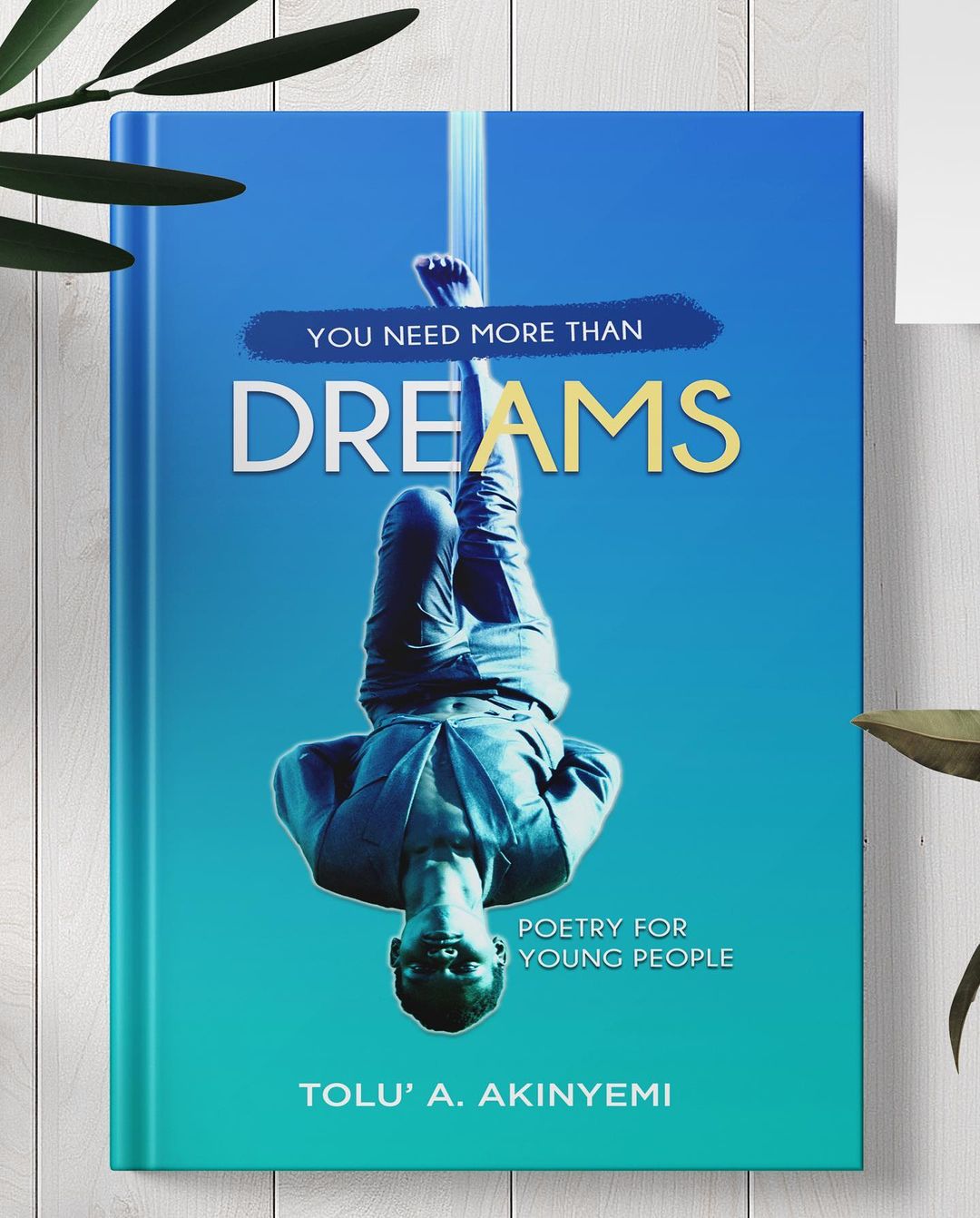
“We carry dreams like pregnant clouds. Our aspirations are fallacious fallacies.”
Multiple award-winning writer Tolu A. Akinyemi, also known as Tolutoludo, with over twenty-one books under his belt, is no stranger to using the simplest of words to convey the deepest of meanings. His poetry does not send you on a chartless errand or leave you wondering about meaning. Instead, it dives right into the heart of the matter, offering you an avenue to ponder, question, and soak up the essence of each poem. In “You Need More Than Dreams,” Akinyemi is clear about his mission and his audience. This collection of fifty-six didactic and instructive poems, divided into two parts, is targeted at young people and teenagers in their formative years. There is a kind of purity this book is desperate for young people to preserve, and it is not ashamed to be prescriptive about it. The poems in this collection are written in hindsight; in that, the poet seems to be writing from the wisdom of the old, as though he is recollecting events and rendering them in verse.
The first poem, “Best Of My Youth,” captures the complexities of growing older, the dilemmas and dynamics of identity, as well as the presence of peer pressure and the youthful carefreeness that often comes with a future cost. The line “I lost my virginity at the flip of a coin,” shows how flippantly some decisions are made by young people. In the same poem, there is a contrast between blooming into a sparkle and becoming a shadow, thus portraying the very complex journey of discovering oneself. This poem is a good opening for the full-length collection as many other poems do exactly what this poem has done in terms of theme and message.
The second poem, “Teenage Fantasies,” explores the clash between personal desires and parental expectations. The desire to be independent among the youth is strong, and this desire is met with friction due to parental authority. We see in “Young Thinker” and “Magic” the power of imagination, the wonder of a dream, and the reality that comes with it. The former is encouraging young people to dream boundlessly, and the latter is telling them not to live on the prisms of dreams and walk the talk. A lot of poems in this collection explore expression, sexuality, innocence, youthful choices, the pursuit of perfection, and the desire of young people to quite literally explode. In “Speak Out,” for example, the opening lines “My tongue is a blistering missile / fleeing from this cage of silence” suggest an escape from a kind of stifling. The lines “Once, / I was both a boy and a shadow” refer to an inner conflict, an uncertainty on the very long journey of becoming. The poem is an open call for young people to always speak their truth.
Anyone who reads this collection can deduce the underlying tones of spirituality. Throughout the book, there are mentions of the celestial, sanctuary, obedience and sacrifice, altars, transgression, holiness, overcoming, consuming fire, prayer, and others. The preservation of youth, especially against roving hands as stated in “Guard Your Body,” is founded upon the presence of a Christian faith.
“You Need More Than Dreams” is a book that wants young people to be vulnerable and bear their insecurities. The lines “Come vulnerable / like a naked wire” in “Vulnerable II” basically admit that the result of baring oneself might be shocking but the spark and freedom that come with it are worth it in the end.
As much as this collection is targeted at the youth, it holds older people accountable. If there are no worthy role models who will the youth look up to? A child’s upbringing colours their youth and can make or break their desire to dream and fulfil their dreams. In “Greys” and many other poems in this collection, we get a sense that wisdom and validation from parents is a great thing for a young person to desire but at what cost? How do young people feel about becoming everything their parents want them to be? What happens to their individuality?
Akinyemi uses metaphors so lightly and excellently to convey his message in this collection. The lines “Let me write this poem / in the simplest of languages/ without heavy metaphors: / you are not inferior,” in his poem “Inferiority Complex” is a testament to this. To emphasise the power of having ingenious ideas in the poem “Ideas,” the poet writes, “A Poverty of ideas is a booby trap / that ensnares even the brightest of men.” The line “My teenage crush was a shawl of serenity” portrays the thrill and comfort that comes with having a teenage crush and how the naivety that led to the crush eventually wanes in the long run.
If the collection did not hint at the pressure and addictive tendencies of social media and how it affects the youth, it would have fallen short in its claim to help young people navigate this sensitive time. The lines “for those pristine pictures are made / pixel perfect / with filters — / edited beauties,” in the poem “Social Media” paint a picture of the false perfection depicted online and warn young people not to be fazed by it. “You Need More Than Dreams” is undeniably tailored for a young audience; however, it seems to lean towards the experiences of young boys. In a sense, teenage boys may resonate more with some poems in this collection than teenage girls would. This book is an excellent recommendation for institutions of learning who want to chart young people on the right path while introducing them to poetry in its basic and true form.
The poem “Gang Wars” in this book is poignant as it is evocative; it talks about urban decay occasioned by violence and youthful delinquencies. The lines “Ten black youths embellished with the Portrait of Delinquency” paint a stark picture of young lives tainted by crime and despair. Sadly, the streets are full of young people accustomed to the hard and fast life and according to the poem ‘Sixteen And Extinct,” our streets have become a memorial of our premature deaths. In ‘Vestiges of Crime’ the poet concludes the poem with a message to the youth. He says; “Don’t be a villain when you can be the moon / kissing the star.”
The second part of this book continues in the discourse of violence and crime and delves deeper into issues like Cancel Culture, Racism, and Feminism. Akinyemi is a poet who pays attention and does his absolute best to make his attentiveness communicable to his audiences. My favourite thing about the collection is the simplicity of it. The language is clear and concise. It is therefore a decent introduction for people who struggle to grasp or connect with poetry in general. “You Need More Than Dreams” makes a good effort to document the instrumental and transitional life experiences of young people and beyond. It explores diverse issues affecting children and teenagers and delivers solutions like a mantra; this book will be a blessing in the hands of anyone in their formative years.
The post BN Book Review: You Need More Than Dreams by Tolu A. Akinyemi | Review By Rose Mgbodichimma appeared first on BellaNaija – Showcasing Africa to the world. Read today!.



